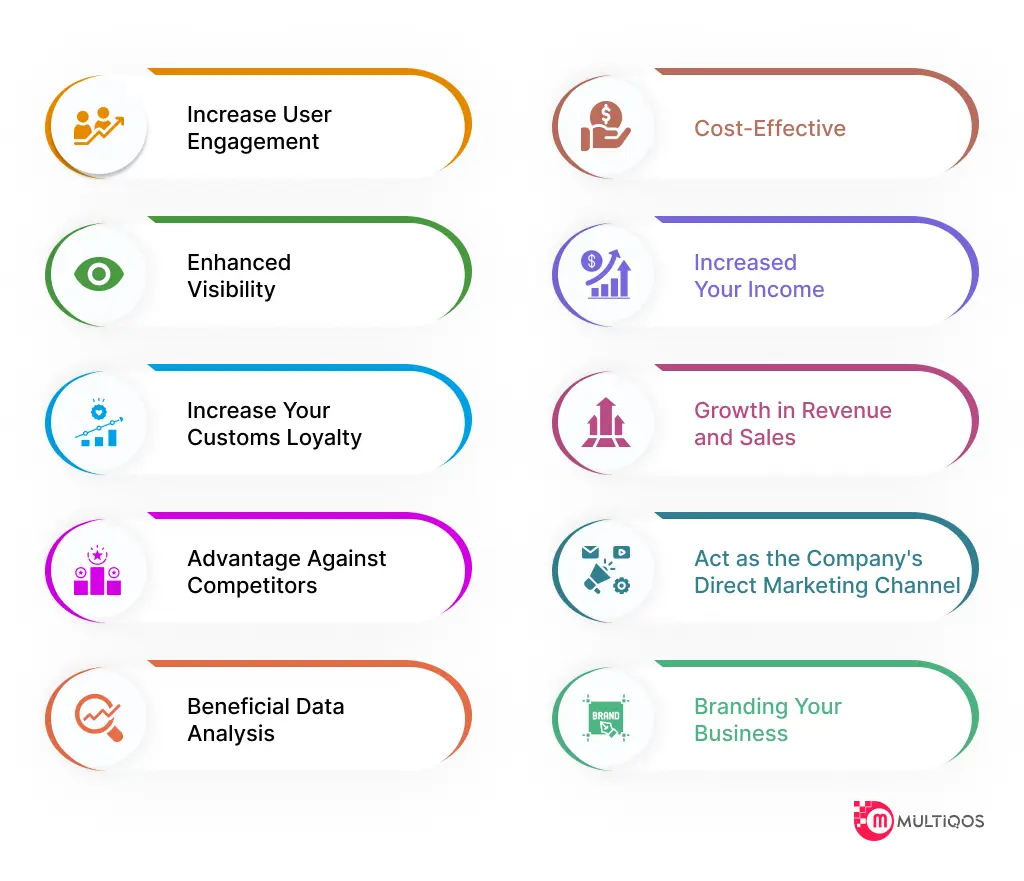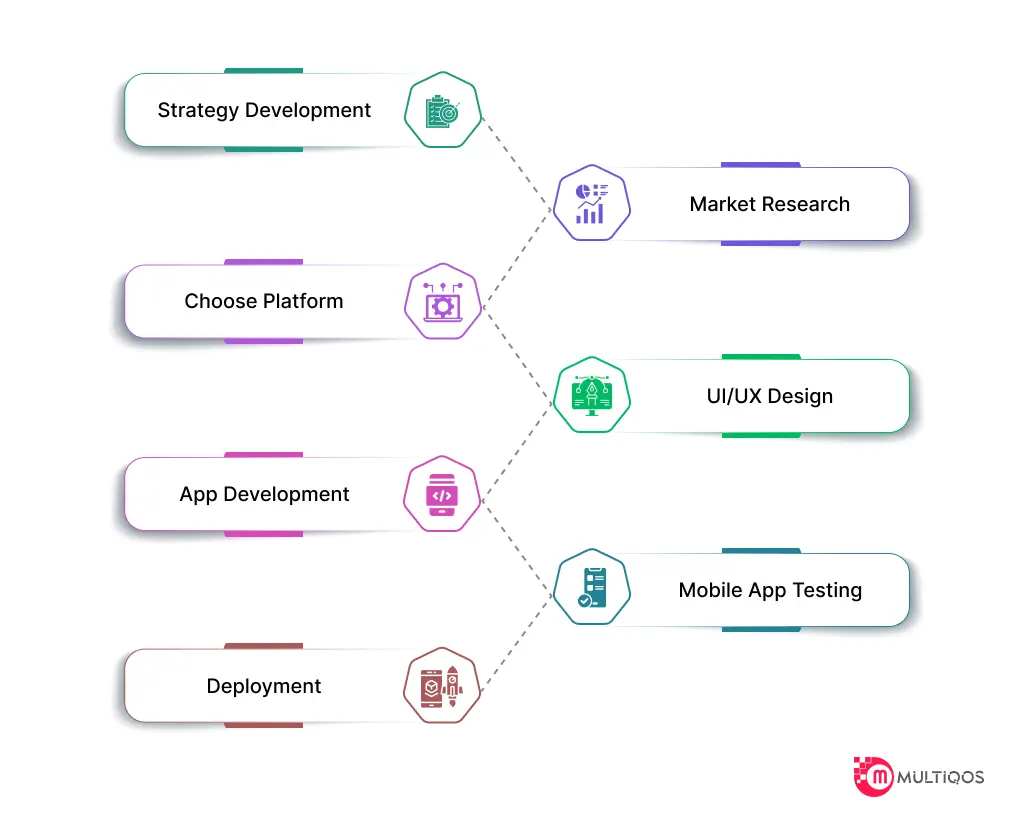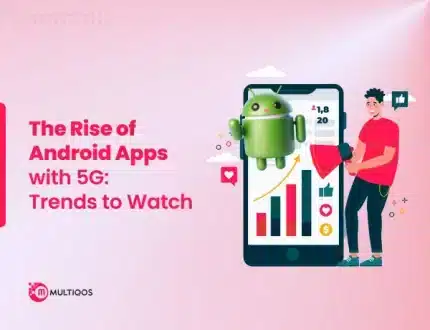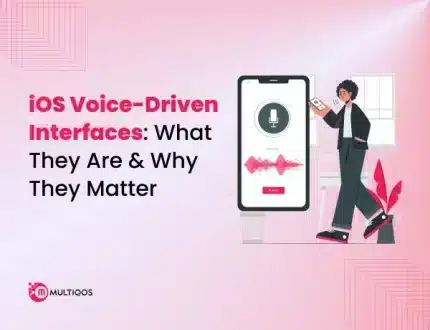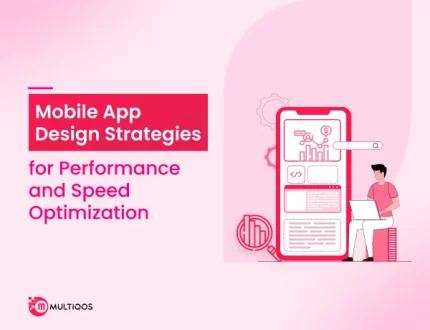A Complete Guide to Mobile App Development for Business to Follow in 2025
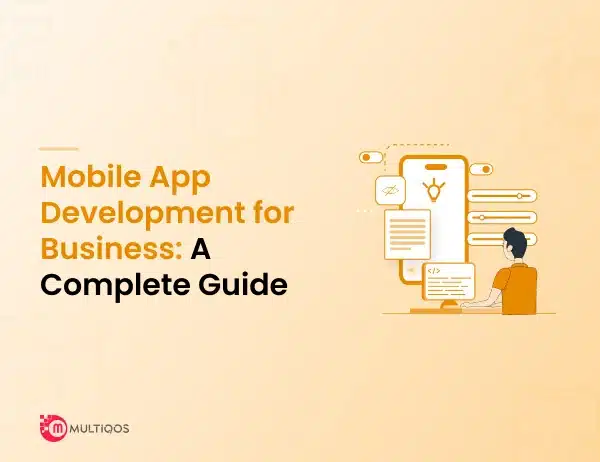
Table of Contents:
- Introduction
- Global Mobile App Market Overview
- Mobile App Development Explained
- Types of App Development
- Benefits of Building Mobile Apps
- Mobile App Development Trends
- Steps to Build a Business App
- Common App Development Mistakes
- Cost of App Development
- MultiQoS Support for App Development
- Conclusion
- FAQs
The digital transformation era has led to a significant increase in mobile app development, with various industries using it to expand their businesses. Since smartphones, wearables, and tablets are becoming more and more popular, over 70% of smartphone user’s worldwide access digital apps, drawing interest from startups, governments, SMEs, and corporations.
Developing successful mobile apps is more necessary for businesses nowadays as it not only improves business processes but also increases IT ROI, and diversifies user’s mobile offerings by focusing on and creating mobile apps for their customers.
Find best practices in mobile app development for businesses in this key essential guide.
An Overview of the Global Mobile App Market
The increasing number of feature-rich smartphones and a growing user base are driving tremendous growth in the mobile app market.
According to Statista’s forecast, the global mobile app market is planned to reach $756 billion by 2027.
As a result of the expansion, there is an increased demand from customers for innovative and user-friendly products. So, big businesses along with SMEs, and start-ups are spending a lot of funds building mobile apps.
Due to the increasing use of mobile devices, 92.3% of internet users—mostly those with smartphones—access the web through their phones, highlighting the growing trends of mobile apps.
What is Mobile App Development?
The process of creating software applications to run on a mobile, such as a smartphone or tablet is known as Mobile app development. Mobile apps are made to run on the Android and iOS (iPhone) operating systems since these apps run on different operating systems (OS) than laptops and desktop PCs.
Types of App Development
Here are the three main types of mobile app development you should know before hiring mobile app developers:
1. Progressive Web Apps (PWAs)
Progressive Web Apps (PWAs) are specifically designed to run on web-based platforms across devices. PWA applications can be accessed through web browsers; however, PWAs give you an app-like experience along with offline functionality.
Developers mostly prefer languages like HTML, JavaScript, CSS, and so on for developing prolific PWA apps with native mobile app features.
2. Native App Development
It is a kind of mobile app development method used to build applications for a specific platform like Android or iOS. Native app development uses the specific platform’s native programming language and development tools for building high-performance applications.
Developers mostly prefer Swift or Objective-C languages for developing apps for the iOS platform and Java or Kotlin languages for developing apps for Android.
3. Hybrid App Development
Just as the name, Hybrid app development uses both web and native app development elements to build applications that can run on multiple platforms. By using this development type, developers use a single source codebase for developing and deploying an application on different platforms.
The cross-platform compatibility of this hybrid app development method enables developers to build and distribute applications to iOS and Android.
Why Build a Mobile App?
Creating a mobile application for a business has numerous advantages, some of which are as follows:
- Increase user engagement– Mobile apps give businesses a direct line of communication with their clients, allowing them to send out updates and personalized messages to inform them about their goods and services. It increases the business’s customer base and boosts its visibility by improving its accessibility.
- Enhanced visibility- Users may easily access mobile apps on their devices. A mobile app may boost a business’s visibility with just a single tap, and reach, boosting the possibility that potential clients will connect with it and making it easier to find.
- Increase your customs loyalty- Offering customer rewards, loyalty plans, special information, and up-to-date business trends will help them make these things a daily habit. Regular engagement with your brand may build trust and loyalty in customers, your app can deepen this connection even more.
- Advantage against competitors- Your business needs to exist in the mobile app market to differentiate itself from the competition. A right and well-appropriate app may help you stand out from the competition and assist in boosting your business.
- Beneficial Data Analysis- You may get information about user preferences and desires by using mobile apps. It May facilitate data-driven decision-making by giving the right information to help understand users and customizing goods and services to fulfill their preferred requirements.
- Cost-effective- Developing a mobile app for a business can save costs because it allows it to reach a large audience with little in the way of marketing expenses.
- Increased your income- In-app purchases, subscriptions, and advertising are some ways that a mobile app might make additional revenue.
- Growth in Revenue and Sales- Businesses can provide their clients with a smooth and easy way to shop by using mobile apps. If you make use of features such as mobile wallets, one-click payments, and in-app purchases, you can boost sales and revenue.
- Act as the company’s direct marketing channel – Businesses can notify customers about new products, deals, or events by sending them customized alerts through mobile apps. The conversion rates for this direct marketing channel can be significantly increased.
- Branding your business- By offering a professional and reliable online presence, a mobile app may help to the improvement of a company’s brand and reputation.
Trends in Mobile App Development
The following are some significant statistics and trends in mobile app development:
- Integration of AI and Machine Learning- The user experience is being revolutionized by the integration of AI and machine learning features into mobile apps. By offering simple, adaptable, and intuitive functions like dynamic interfaces, customized details, and intelligent navigation, AI development can improve app users’ experiences. AI constantly advances the user experience, which may increase user happiness and engagement in addition to making apps better.
- Cross-platform app development- Cross-platform app development tools are preferred by most mobile developers worldwide because they allow them to access a larger audience on a variety of devices and operating systems. With the help of such features, applications with one look and feel on several platforms can be developed.
- IoT Integration- IoT integration is a big trend because mobile apps are necessary for managing and keeping an eye on these gadgets. Mobile apps with IoT features boost smart offices & homes by streamlining tasks, streamlining processes, and lowering energy use. With smartphones, they can now also control their entertainment, security, heating, and lighting systems. By 2030, 30 billion devices are expected to be connected to the Internet of Things (IoT), according to data published in Statista.
- Predictive Analysis – Predictive Analysis is one of the latest trends in app development used by developers to predict future events using collected data. Predictive Analysis uses AI and ML technologies to function better. App developers use this trend to forecast customer engagement and to increase customer retention.
- Augmented reality and virtual reality – Augmented reality (AR) and Virtual reality (VR) are one of the emerging trends in mobile app development. App Developers make use of AR and VR tech to enhance the viewing experience of the users. Most gaming applications prefer implementing these techs to create real-world imagery in real time.
Key Steps to Build a Mobile Application for Business
I. Pre-development Process:
Before development, first you should consider in-house or agency options, choose a mobile app development company, anticipate costs, and app ideation, and understand the development phases.
1. Set your Goals and strategy
Determine your mobile app’s goals and objectives before beginning the development process. Choose the app’s target audience, its function, the problems it will attempt to address, the advantages it can provide, and the audience it is aimed at.
Continue your investigation and analysis of your chosen audience, considering their requirements and preferences.
2. Market Research
Market research is crucial for identifying the target market, preferences, and potential competitors, as well as identifying the app’s unique selling proposition, ensuring commercial success.
3. Choose the platform
Because every platform has different development needs, choosing the right platform is essential whether you’re developing an iOS, Android, or both apps. Decide which is best for your target market and your business after evaluating your options.
4. UX Design and (UI) User interface
The goal of UI UX design services is to represent the functionality and design of your software through an intuitive user interface. Diagrams & designs should be developed to figure out the app’s functionality. Additionally, you’ll be able to understand the appearance and functionality of the application better.
5. Build your app
- In the app creation step it needs to integrate APIs of front-end development and third-party Services.
- APIs facilitate easy data flow between apps and other systems, providing new functionalities.
- Third-party or back-end services offer system architecture, and database prefabricated fixes for problems with payments, analytics, and other areas.
- Front-end development in the areas of interface, features, architecture, and design
In addition, you can choose a strategy for development by establishing a team, employing a project manager, developing a timeline with targets and checkpoints, and being able to adapt to allow for changes.
6. Testing Your Mobile App
Before launching the app some crucial testing steps include:
- Flawless functionality testing to check each feature works as expected and enhances user experience
- Usability testing to check intuitiveness and ease of use,
- Performance testing like load times, Volume, Stability, and responsiveness
7. Launch your application
Once testing is complete, the application is prepared for submission to the relevant app store, such as the Play Store or the Apple Store.
This step includes:
- Create or register your app on the app store
- Fill in the required information about the app
- Submit the app for review, once your app has been approved; your app is ready for download and use.
II. Post Development Process:
Following the development, testing, and launch of your app, a few essential processes must also be completed.
- Security and Data Protection- Implementing strong security mechanisms is essential as it provides data safety, guarantees user privacy, follows regulations, and makes a reputed app that builds user trust and long-term success.
- Marketing your app- Consider making engaging and informative videos that show your app’s features to effectively sell it to your target audience. Use all trendy digital mediums to promote your app on social media to reach worldwide users.
Mistakes to Avoid When Developing Mobile Apps
- Poor User Interface – An application with unsatisfactory UX/UI will cause you to lose the customer base with poor user experience. However, incorporating better UI/UX will lead to a higher user engagement rate and an increase in conversion rate.
- Ignoring Platform Guidelines – During the app development process you should adhere to the rules and regulations provided by the concerned Play Store or App Store. Failing to do so, your app will get rejected from enlisting.
- Not Understanding Target Audience – It is essential to conduct market research on potential audience groups before starting the development process. Otherwise, it will lead to costly mistakes as you are unable to evaluate the product according to the needs of the target audience.
- Lack of Testing – It is one of the necessities to do a comprehensive testing operation before launching the application. Otherwise, your application will be at risk of getting negative reviews from frustrated users.
- Stuffing More Features – Incorporating too many features into your application will confuse the users. So, it’s better to focus only on including essential features to achieve a seamless user experience.
- Underestimating App Development Cost – Underestimating app development cost is one of the biggest mistakes many businesses make. If you fail to predict the actual development cost, it will lead to budget constraints and incomplete projects.
The Cost of Mobile App Development
Mobile app development costs wouldn’t be the same for all projects. The development cost varies on several factors. However, in general for developing a seamless mobile application, the mobile app development cost might start from $15,000 to $50,000. But still, the price could deviate upon the influence of factors which are listed below.
-
- Complexity – Developing an app with complex features and advanced functionality will cost more development time & consume more resources. This may lead to an increase in development costs.
- Design – App with well-designed UI/UX, graphics, visual assets, animations and so, will add more cost for the development.
- Functionality & Performance – App development for multiple platforms and developing a complex function that requires separate coding will influence the development cost a lot.
- Backend development & APIs – Cost of development increases upon the usage of database integration, server-side infrastructure upgrade, using APIs, building a robust backend, and so on.
- Maintenance & Update – Maintenance and update Cost would vary on the need for regular maintenance, updates, and feature enhancements after the app deployment.
How Can MultiQoS Help in Your App Development Journey?
MultiQos is a leading mobile application development company with 12+ years of experience. With more than 370 satisfied clients from all over the world, we developed more than 500+ projects for all industrial verticals. We have expertise in creating customized mobile app solutions using agile and scrum methodologies for clients according to their needs.
Hire mobile app developers of MultiQos, who have helped several businesses by creating mobile applications with excellent features that customers would embrace. Take a look over some of our mobile app development portfolio.
Our wallet and payment application, Cryptic has successfully secured numerous downloads due to its unique features like DeFi, enhanced security, seamless transaction.
Sales Trend Analysis Platform, Sales Analytics helps users with monitoring sales performing and visual data representation. This application helps users with sales-driven insights within just a few clients.
Being a reputed mobile app development company, we are well-versed in app development; hire mobile app developers for developing applications in any industry with exceptional remarks.
Bottom Line
The success of an app depends on its capacity to accommodate user preferences and wants while keeping up with new technological developments. Launch your mobile app development project right now to take advantage of a plethora of lucrative opportunities.
Developing and sustaining a mobile app that achieves its goals requires the assistance of a reliable development agency.
FAQ on Mobile App Development for Business
Yes! Most of the mobile applications we develop support both iOS and Android platforms. People these days prefer their apps to work across web and mobile platforms, so we pick suitable frameworks for the development.
Yes! We are the app developing experts; we can provide you with a fixed quote before we begin the project right after discussing the full project specifications. You can always account for us to deliver precise products that we put on paper for the exact cost we quote. Request for project quote now!
Yes! You would own the appropriate copyrights and license rights for the bespoke app source code we write for you. Being a high-reputation mobile app development service provider, we are 100% transparent with the intellectual property rights from the project beginning.
Development and deployment would never be the same for all projects. There are several factors to be addressed promptly like planning, designing, developing, user acceptance testing, and deployment to launch a successful project. In general, developing and launching a mid-size application will take around 5-6 months. However, the time duration might increase or decrease depending on the app’s complexity and functionality.
As a leading mobile app development company, we follow cyber-essential guidance to ensure all products we develop come with the best security measures. We use two-way encryption for storing app data and follow all the industry’s best practices along with frequent security & vulnerability audits.
Yes, we do provide ongoing support, maintenance, and regular updates to your app for the initial few months after the deployment to ensure your app performs well. At the same time, you have the option to hire mobile app developers to get small ad-hoc support, improvements, updates, and maintenance at nominal charges.
Get In Touch

